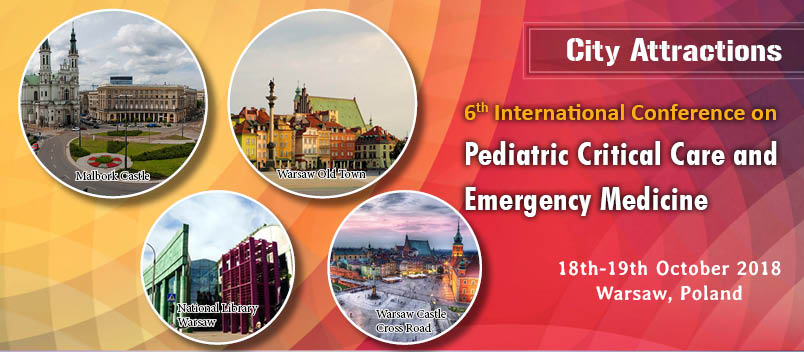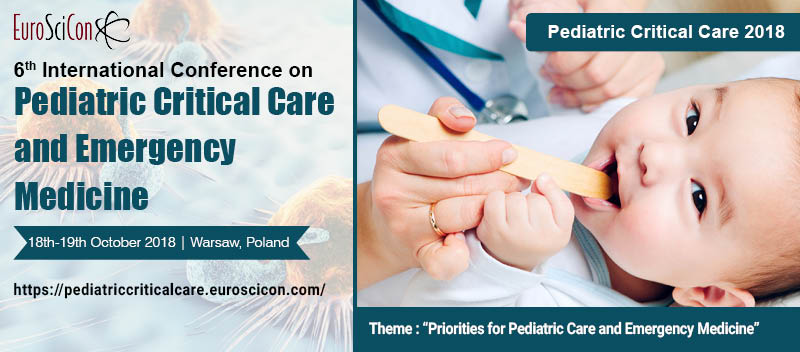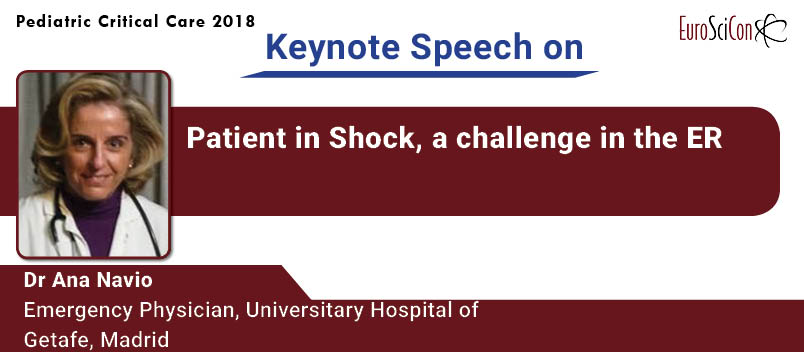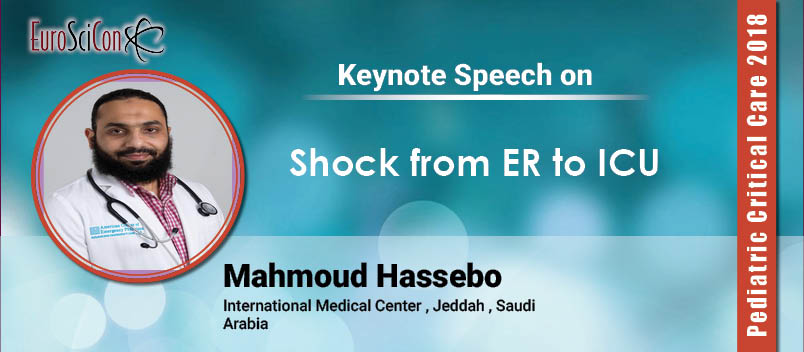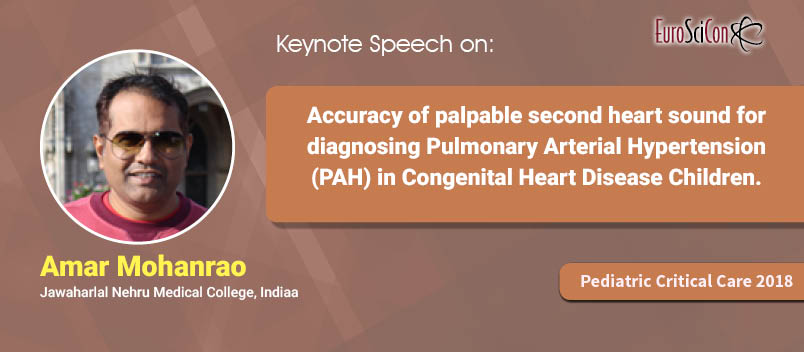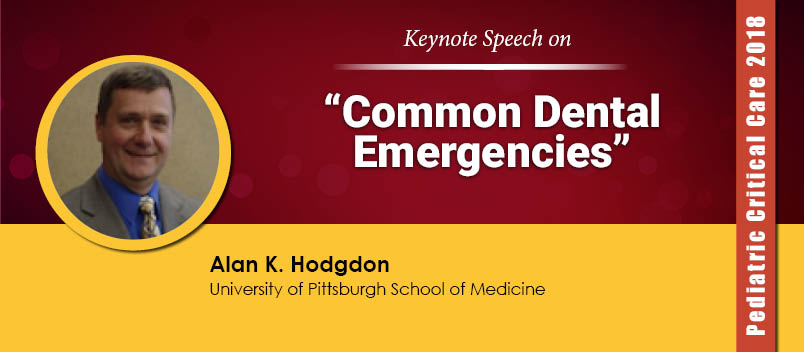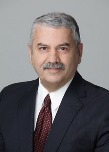Pediatric Critical Care 2018
Tracks/Sessions
Track 01: Emergency Pediatric Care (EPC) | Pediatric Critical Care | Pediatric Conferences 2018 | Pediatric Meetings 2018 | Pediatric Emergency Medicine
“Children are not small adults” has long been the battle cry of pediatric emergency medicine specialists seeking to advocate for better training and resources for all providers of urgent and emergent pediatric medical care. The Emergency Pediatric Care (EPC) course focuses on critical pediatric physiology, illnesses, injuries and interventions to help EMS practitioners provide the best treatment for sick and injured children in the field. This stresses critical thinking skills to help practitioners make the best decisions for their young patients.

- Obstacles to establishing critical care nursing.
- Medical Equipment.
- Infrastructure and Logistical Organization.
Track 02: Pediatric Critical Care |Pediatric Critical Care | Pediatric Conferences 2018 | Pediatric Meetings 2018 | Pediatric Emergency Medicine
The evolution of pediatric critical care medicine has been a long process of progress in ventilation and resuscitation, physiology and anatomy, anesthesia, anesthesiology, neonatology, pediatric general and cardiac surgery, and pediatric cardiology. The role of nursing is absolutely central to the evolution of critical care units. Pediatric critical care physicians have made remarkable achievements in the understanding and treatment of critically ill children. We have seen great progress in the national and international organization of pediatric critical care medicine as well as in education and research in the field. Better and increased use of technology has advanced the care of critically ill children but has also created an environment with increasing errors, complications, and sequelae and a greater need for humane, caring environments for the patients and their families.

The role of procedures in a practice of primary care differs markedly in the care of children vs. the care of adults. This phenomenon is partially the result of the more challenging aspects of the care of infants and small children with regard to the ability to maintain a sterile field for procedures, and the relative infrequency with which procedures are performed on children relative to adults.The scope of practice for pediatricians in the community has changed over time and is likely to continue to change.

- Bladder Catheterization
- Lumbar puncture
- Respiratory Services
- Intravenous procedures
Track 04: Use of Emergency Medicines in Pediatric |Pediatric Critical Care | Pediatric Conferences 2018 | Pediatric Meetings 2018 | Pediatric Emergency Medicine
Dealing with medical emergencies. (These often require special techniques and procedures.) Providing treatment that meets the unique medical needs of infants, children, teens, and young adults. This includes giving medications and using special equipment in specific ways. Detecting problems in children who are unable to be patient and cooperative. Easing the pain and anxiety that a medical emergency can cause families. Research and education in pediatric emergency medicine.
- Types of Emergency Services.
- Staff of Emergency services.
- Qualities of Emergency Services
Track 05: Pre & Post-Operative Critical Care in pediatric |Pediatric Critical Care | Pediatric Conferences 2018 | Pediatric Meetings 2018 | Pediatric Emergency Medicine
There are a number of reasons for our involvement with the surgical patients. Surgical patients are excellent examples of organisms under stress, and a great deal of acute physiology can be learned by caring for them--airway and pulmonary issues, fluid/electrolyte issues, neuroendocrine response to stress, pain and sedation, etc. The patient in ICU must be cared for in a collaborative fashion with the primary surgical service. In general, pediatricians know about infants and children, and “medical” issues, and surgical attendings/residents know about “surgical/technical” issues. If a collaborative relationship is formed, the patients will receive the best of both sets of knowledge. Finally, because of the potential for miscommunication to lead to mis-understandings and problems with care, these patients present excellent opportunities to practice the art of communication and finesse.

- Pain Management
- Vitals Assessment
- Psychological Care
Track 06: Infectious Disease in Pediatric |Pediatric Critical Care | Pediatric Conferences 2018 | Pediatric Meetings 2018 | Pediatric Emergency Medicine
Infectious diseases are caused by pathogenic microorganisms, such as bacteria, viruses, parasites or fungi; the diseases can be spread, directly or indirectly, from one person to another. Zoonotic diseases are infectious diseases of animals that can cause disease when transmitted to humans.

- Pandemic and epidemic diseases
- Neglected tropical diseases
- Tropical Diseases
Track 07: Pediatric Dermatology |Pediatric Critical Care | Pediatric Conferences 2018 | Pediatric Meetings 2018 | Pediatric Emergency Medicine
Pediatric dermatology is an exciting area of medicine. When children are young, they cannot give a history. In fact, pediatrics is said to be much like veterinary medicine! The practitioner must use sharp observational skills to assess a problem. For example, rather than asking a 1 year old if they scratch or if a rash itches, merely observing the child scratching in the office or seeing excoriations on the skin will lead a physician to the correct conclusion. Thus, looking for clues further sharpens one’s visual skills.

- Acne
- Viteligo
- Psoriasis
- Pediatric Atopic Dermatitis
- Current Issues in Pediatric Dermatology
Track 08: Pediatric Cardiology |Pediatric Critical Care | Pediatric Conferences 2018 | Pediatric Meetings 2018 | Pediatric Emergency Medicine
The suspicion of a cardiovascular abnormality may be raised initially by specific symptoms, but more commonly the presenting feature is the discovery of a cardiac murmur. Many children with a cardiac abnormality are asymptomatic because the malformation does not result in major hemodynamic alterations. Even with a significant cardiac problem, the child may be asymptomatic because the myocardium is capable of responding normally to the stresses placed upon it by the altered hemodynamics. A comparable lesion in an adult might produce symptoms because of coexistent coronary arterial disease or myocardial fibrosis. In obtaining the history of a child suspected of cardiac disease, the physician seeks three types of data: those suggesting a diagnosis, assessment of severity, and indicating the etiology of the condition.

- Unique cardiac conditions in newborn infants
- A healthy lifestyle and preventing heart disease in children
- Environmental and genetic conditions associated with heart disease in children
Track 09: Pediatric Neurology and Psychology|Pediatric Critical Care | Pediatric Conferences 2018 | Pediatric Meetings 2018 | Pediatric Emergency Medicine
Neurologic emergencies arise frequently and, if not diagnosed and treated quickly, can have devastating results, with high rates of long-term disability and death. Prompt recognition is an important skill. This article provides detailed analyses of acute stroke, subarachnoid hemorrhage, status epilepticus, and other neurologic emergencies for physicians who are not neurologists.

- Status epilepticus
- Seizure
- Pediatric migraine
- Guillain-barré syndrome
- Tick paralysis
Track 10: Pediatric Ophthalmology |Pediatric Critical Care | Pediatric Conferences 2018 | Pediatric Meetings 2018 | Pediatric Emergency Medicine Pediatric ophthalmologists focus on the development of the visual system and the various diseases that disrupt visual development in children. Pediatric ophthalmologists also have expertise in managing the various ocular diseases that affect children. Pediatric ophthalmologists are qualified to perform complex eye surgery as well as to manage children's eye problems using glasses and medications. Many ophthalmologists and other physicians refer pediatric patients to a pediatric ophthalmologist for examination and management of ocular problems due to children's unique needs. In addition to children with obvious vision problems, children with head turns, head tilts, squinting of the eyes, or preferred head postures (torticollis) are typically referred to a pediatric ophthalmologist for evaluation. Pediatric ophthalmologists typically also manage adults with eye movement disorders (such as nystagmus or strabismus) due to their familiarity with strabismus conditions.

- Strabismus
- Amblyopia
- Nystagmus
- Convergence_insufficiency
- Ptosis
Track 11: Diabetic and Endocrine Emergencies |Pediatric Critical Care | Pediatric Conferences 2018 | Pediatric Meetings 2018 | Pediatric Emergency Medicine Endocrine emergencies represent a group of potentially life-threatening conditions that are frequently overlooked, resulting in delays in both diagnosis and treatment, factors that further contribute to their already high associated mortality rates. As such, the true incidence of primary endocrine emergencies is not well defined, which is likely because the disease process is often not recognized. Although endocrine emergencies are often encountered in patients with a known endocrinopathy, the emergency may be the initial presentation in previously undiagnosed individuals. If these endocrine disorders are not rapidly identified or if specific treatment is delayed, significant complications or even death may occur.

- Diabetic Ketoacidosis
- Myxedema Coma
- Adrenal Insufficiency
Track 12: Evidence based antibiotic use |Pediatric Critical Care | Pediatric Conferences 2018 | Pediatric Meetings 2018 | Pediatric Emergency Medicine
Evidence-based medicine (EBM) is an approach to medical practice intended to optimize decision-making by emphasizing the use of evidence from well-designed and well-conducted research. Although all medicine based on science has some degree of empirical support, EBM goes further, classifying evidence by its epistemologic strength and requiring that only the strongest types (coming from meta-analyses, systematic reviews, and randomized controlled trials) can yield strong recommendations; weaker types (such as from case-control studies) can yield only weak recommendations. The term was originally used to describe an approach to teaching the practice of medicine and improving decisions by individual physicians about individual patients. Use of the term rapidly expanded to include a previously described approach that emphasized the use of evidence in the design of guidelines and policies that apply to groups of patients and populations ("evidence-based practice policies").It has subsequently spread to describe an approach to decision-making that is used at virtually every level of health care as well as other fields (evidence-based practice).
Track 13: Toxicology and Environmental Emergencies |Pediatric Critical Care | Pediatric Conferences 2018 | Pediatric Meetings 2018 | Pediatric Emergency Medicine
Natural and man-made emergencies or disasters can occur anywhere in the world including any Minnesota county. Such incidents and their aftermath can affect human health, people’s lives, and the critical infrastructure that supports our society. Disasters can be classified according to their speed of onset (sudden or slow), their scale (minor, moderate or major), and their cause (natural or man-made). The role of environmental health staff in a public health emergency, such as a natural or man-made disaster, will vary according to the type (e.g., terrorist related, fl ood, tornado, fi re, or prolonged power outage) and severity of the situation. Environmental health staff have the primary responsibility for the “health” of a community following a disaster. This includes basic services such as food safety, water supply, shelter, sanitation, and waste management that need to be reestablished.

- Burns.
- Snake bites.
- Drowning.
Track 14: Total Parental Nutrition in Pediatrics |Pediatric Critical Care | Pediatric Conferences 2018 | Pediatric Meetings 2018 | Pediatric Emergency Medicine
Total parenteral nutrition (PN) is the feeding of a person intravenously, bypassing the usual process of eating and digestion. The person receives nutritional formulae that contain nutrients such as glucose, salts, amino acids, lipids and added vitamins and dietary minerals. It is called total parenteral nutrition (TPN) or total nutrient admixture (TNA) when no significant nutrition is obtained by other routes, and partial parenteral nutrition (PPN) when nutrition is also partially enteric. It may be called peripheral parenteral nutrition (PPN) when administered through vein access in a limb rather than through a central vein as central venous nutrition (CVN).

- Electrolyte importance in children
- TPN Techniques
Track 15: Gastroenterology and hepatic emergencies | Pediatric Critical Care | Pediatric Conferences 2018 | Pediatric Meetings 2018 | Pediatric Emergency Medicine
Certain gastrointestinal disorders can be life threatening and require emergency treatment. For many people, emergency treatment involves surgery. Gastrointestinal (GI) emergencies in infants and children often present similarly. Key historical facts alert the emergency physician to these surgical conditions that require immediate interventions.

- Acute Abdominal Pain
- Hepatic Encephalopathy
- Biliary Tract Obstruction
Track 16: Dental Emergencies | Pediatric Critical Care | Pediatric Conferences 2018 | Pediatric Meetings 2018 | Pediatric Emergency Medicine
Dental emergency is a broad, umbrella term used to describe an issue involving the teeth and supporting tissues that is of high importance to be fixed/treated by the relevant professional. Dental emergencies do not always involve pain, although this is a common signal that something needs to be looked at. Pain can originate from the tooth, surrounding tissues or can have the sensation of originating in the teeth but be caused by an independent source (orofacial pain and toothache). Depending on the type of pain experienced an experienced clinician can determine the likely cause and can treat the issue as each tissue type gives different messages in a dental emergency. Many emergencies exist and can range from bacterial/fungal/viral infections to a fractured tooth or dental restoration, each requiring an individual response and treatment that is unique to the situation. Fractures (dental trauma) can occur anywhere on the tooth or to the surrounding bone, depending on the site and extent of fracture the treatment options will vary.

- Dental Trauma
- Restorative Emergencies
- Orthodontic Emergencies
Track 17: Orthopedic Emergencies | Pediatric Critical Care | Pediatric Conferences 2018 | Pediatric Meetings 2018 | Pediatric Emergency Medicine
Many well-seasoned emergency physicians often find it challenging to assess and treat pediatric patients regardless of the complaint. Because of anatomic and physiologic differences, pediatric patients experience orthopedic injuries that are both unique and specific to this subset of the population. Emergency physicians must be aware of these nuances to properly diagnose and treat these injuries.

- Upper Extremity Injuries
- Lower Extremity Injuries
- Non Accidental Injuries
About conference
Pediatric Critical Care 2018 is a novel event scheduled for International pediatric welfare professionals to endow the knowledge related to tools, techniques, technologies, medicines and advancements in critical care and emergency medicine. The congregation is going to be held on October 18-19 , 2018 in Warsaw, Poland. The conference concentrates and throws the light on “To Discuss and Evaluate Advanced Therapeutic and Modern Pediatric critical care Technologies”.
The conference proceedings include symposiums and workshops, keynote speeches, plenary talks, poster sessions and panel discussion on latest research developments in the field of Critical Care.which will provide an international platform for discussion of present and future challenges in Pediatrics, Pediatrics education, continuing education and expertise meeting. World-leading health practitioners, clinicians, educators and researchers will present cutting-edge and practical clinical techniques based upon widely accepted evidence and will introduce new and emerging research.
EuroSciCon is the longest running independent life science events company with a predominantly academic client base. Our multiprofessional and multispeciality approach creates a unique experience that cannot be found with a specialist society or commercially.
About Critical Care and Emergency Medicine
Critical care services meet the needs of patients facing an immediate life-threatening health condition—specifically, that in which vital system organs are at risk of failing. Using advanced therapeutic, monitoring and diagnostic technology, the objective of critical care is to maintain organ system functioning and improve the patient’s condition such that his or her underlying injury or illness can then be treated.
These services are provided by specialized teams of health care professionals in adult intensive care units, pediatric intensive care units and in a variety of post-operative and step-down units. Thus, critical care units play a pivotal role in acute care hospitals. If these units get overwhelmed with a sudden spike or surge in patient volumes, some surgeries are cancelled and emergency department wait times can get backed up. These services are both expensive and limited.
Emergency medicine is the medical specialty dedicated to the diagnosis and treatment of unforeseen illness or injury. It encompasses a unique body of knowledge as set forth in the “Model of the Clinical Practice of Emergency Medicine.” The practice of emergency medicine includes the initial evaluation, diagnosis, treatment, coordination of care among multiple providers, and disposition of any patient requiring expeditious medical, surgical, or psychiatric care.
Emergency medicine is not defined by location, but may be practiced in a variety of settings including hospital-based and freestanding emergency departments (EDs), urgent care clinics, observation medicine units, emergency medical response vehicles, at disaster sites, or via telemedicine.
Emergency medicine encompasses planning, oversight, and medical direction for community emergency medical response, medical control, and disaster preparedness. Emergency medicine professionals provide valuable clinical, administrative, and leadership services to the emergency department and other sectors of the health care delivery system.
MARKET ANALYSIS REPORT
Critical care or intensive care is the close monitoring and treatment given to individuals with acute, life-threatening illness or injuries such as shock, burns, accidents, complicated surgeries, sepsis, and severe breathing problems. It usually takes place in an ICU or trauma center. Plasma is the fluid portion of the blood, in which all the blood cells are suspended. It makes up about 55% of the total volume of the blood. The other components such as red blood cell (RBC), white blood cell (WBC), and platelets together comprise the remaining 45% of the blood. Plasma is mainly made up of water, which accounts for about 91% of the total volume.
Technavio's analysts forecast the global critical care therapeutics market to grow at a CAGR of 3.62% during the period 2017-2021.
The market is divided into the following segments based on geography:
- Americas
- APAC
- EMEA
Key vendors
- CSL Behring
- Grifols
- Kedrion Biopharma
- Octapharma
- Shire
Other prominent vendors
- Abeona Therapeutics
- ADMA Biologics
- Albumedix
- Armetheon
- Asklepios BioPharmaceutical
- Aspen Pharma
- Baxter
- Bayer HealthCare
- Bio Products Laboratory
- BioDelivery Sciences
- Biogen Idec
- BioMarin
- Biotest Pharmaceuticals
- Bristol-Myers Squibb
- Catalyst Biosciences
- China Biologic Products
- Cosmo Pharmaceuticals
- Kamada
- King Pharmaceuticals
- Medxbio
- Merck
- Mitsubishi Tanabe Pharma
- Novo Nordisk
- Novozymes
- Portola Pharmaceuticals
- ProMetic Life Sciences
- rEVO Biologics
- Rockwell Medical
- Sanquin
- Shanghai RAAS
- Teva Pharmaceutical
- The Medicines Company
- Thermo Fisher Scientific
- Tianjin SinoBiotech & Beijing Bio-Fortune
- Ventria Bioscience
Market driver
Growing preference for marketed products over alternative treatment options.
Market challenge
- Existence of plasma fractionation supply and demand gap.
Market trend
- Increased development of recombinant products for critical care use.
Learn More
Pediatric Critical Care Universities Africa :
Université de Sétif | University of Algiers | University of Oran | Pediatric Conferences | University of Constantine | University of Batna | Pediatric Critical Care Conferences | University of Blida | University of Mostaganem | University of Annaba | Agostinho Neto University | University of Botswana | Université Espoir d'Afrique | Université de Ngozi | Euroscicon | Université du Burundi | Emergency Medicine Conferences | Pediatric Trauma Conferences | Pediatric Conferences 2018 USA | Pediatric Critical Care Conferences Europe | Institut Supérieur des Sciences de la Santé | Unité de Formation et de Recherche en Sciences de la Santé | Ain Shams University Faculty of Medicine | Alexandria Faculty of Medicine | Assiut Faculty of Medicine | Pediatric Conferences | Benha Faculty of Medicine | Faculty of Medicine Zagazig University | Fayoum Faculty of Medicine | Kasr El-Aini Faculty of Medicine | Mansoura Faculty of Medicine | Minia Medical School | Misr University for Science and Technology | Pediatric Conferences | Monoufia Faculty of Medicine | Sohag Faculty of Medicine | Pediatric Critical Care Conferences | Suez Canal Faculty of Medicine | Tanta Faculty of Medicine | Orotta School of Medicine | Adama University | Addis Ababa University | Gondar College of Medical Sciences | Haramaya University | Emergency Medicine Conferences | Pediatric Trauma Conferences | Pediatric Conferences 2018 USA | Pediatric Critical Care Conferences Europe | Hayat Medical College | Jimma University | Hawassa University | Mekelle University | MyungSung Medical College | St. Paul's Hospital Millennium Medical College | Critical Care Conferences | Bahirdar University college of medicine & health science | Pediatric Conferences | Accra College of Medicine | University of Cape Coast | Pediatric Conferences | University of Ghana | University of Health and Allied Sciences | Pediatric Critical Care Conferences | Aga Khan University Medical School
Harvard University | University of Cambridge | Emergency Medicine Conferences | Pediatric Trauma Conferences | Pediatric Conferences 2018 USA | Pediatric Critical Care Conferences Europe | University of Oxford | Massachusetts Institute of Technology | Stanford University | Pediatric Critical Care Conferences | Johns Hopkins University | Karolinska Institute | Pediatric Conferences | University of California | University of California | Pediatric Conferences | Yale University | University College London | Imperial College London | Pediatric Conferences | The University of Melbourne | University of California Berkeley | university of torronto | Emergency Medicine Conferences | Pediatric Trauma Conferences | Pediatric Conferences 2018 USA | Pediatric Critical Care Conferences Europe | University of California San-Diego | Pediatric Conferences | The University of Sydney | King’s College London | Duke University | Pediatric Conferences | National University of Singapore | University of Edinburgh | Pediatric Conferences | The University of Tokyo | Pediatric Critical Care Conferences | University of Pennsylvania | University of Washington | Cornell University | Columbia University | Critical Care Conferences | University of Copenhagen | McGill University | Monash University | University of British Columbia | Euroscicon | Pediatric Conferences | University of Michigan | The University of Queensland | Emergency Medicine Conferences | Pediatric Trauma Conferences | Pediatric Conferences 2018 USA | Pediatric Critical Care Conferences Europe | Washington University in St Louis | University of Hong Kong | Seoul National University | University of Amsterdam | University of Chicago | London School of Hygiene & Tropical Medicine | University of North Carolina | Euroscicon | Kyoto University | Pediatric Critical Care Conferences | Boston University | Ruprecht-Karls-Universität Heidelberg | University of Zurich | Ludwig-Maximilians-Universität München | Euroscicon | National Taiwan University | New York University | Emergency Medicine Conferences | Pediatric Trauma Conferences | Pediatric Conferences 2018 USA | Pediatric Critical Care Conferences Europe | The University of New South Wales | University of Glasgow | Uppsala University | The University of Manchester
Europe Pediatrics Universities:
University of Graz | University of Innsbruck | ontanuniversität Leoben | Johannes Kepler University | Ghent University | University of Split | University of Zagreb | Charles University | Pediatric Critical Care Conferences | Palacký University | University of Pardubice | University of Copenhagen | Aalto University | University of Grenoble | Emergency Medicine Conferences | Pediatric Trauma Conferences | Pediatric Conferences 2018 USA | Pediatric Critical Care Conferences Europe | Lille Univeristy | University of Lyon | Pediatric Conferences | Chimie paris tech | Pediatric Conferences | Laboratory Analytical Sciences Bio-analytics and Miniaturization | Univeristy of Poitiers | Critical Care Conferences | University of Pau and Adour Country | University of Reims Champagne-Ardenne | University of Strasbourg | University in Aachen| University of Bayreuth | Technical University of Berlin | Free University of Berlin | Pediatric Critical Care Conferences | Ruhr University Bochum | University of Bonn| University of Alicante | Euroscicon | University of Barcelona | University of the Basque Country | University of Cádiz | Emergency Medicine Conferences | Pediatric Trauma Conferences | Pediatric Conferences 2018 USA | Pediatric Critical Care Conferences Europe | University of Extremadura | University of Granada | University of Jaén | Pediatric Critical Care Conferences | University of Oviedo | University of Santiago de Compostela | University of Valladolid | University of Vigo | University of Zaragoza | Stockholm University | Euroscicon | University of Bradford | University College Cork | Masaryk University | Euroscicon | Robert Gordon University | Pediatric Critical Care Conferences | Sheffield Hallam University | Critical Care Conferences | Emergency Medicine Conferences | Pediatric Trauma Conferences | Pediatric Conferences 2018 USA | Pediatric Critical Care Conferences Europe | University of Southampton | University of Warwick | Pediatric Critical Care Conferences
Brigham Young University | California State University | California State University | Case Western Reserve University | Clarkson University | Cleveland State University | Florida State University | Pediatric Conferences | Georgetown University | Pediatric Critical Care Conferences | The George Washington University | Governors State University | Howard University | Illinois Institute of Technology | Indiana University | Emergency Medicine Conferences | Pediatric Trauma Conferences | Pediatric Conferences 2018 USA | Pediatric Critical Care Conferences Europe | Kansas State University | Kent State University| Marquette University | Miami University | Pediatric Critical Care Conferences | Pediatric Conferences | Northeastern University | Old Dominion University | Oregon State University | Purdue University | New Brunswick Piscataway | Seton Hall University | South Dakota State University | Stevens Institute of Technology | Tufts University | University of Cincinnati | University of Georgia | University of Louisville | University of Maryland | University of Missouri | Euroscicon | Pediatric Conferences | The University of Montana | University of Nebraska | University of Southern Mississippi | Pediatric Conferences | Pediatric Critical Care Conferences | University of South Florida | The University of Tennessee | The University of Texas at Austin | University of Toledo | Vanderbilt University | Critical Care Conferences | Wake Forest University | Emergency Medicine Conferences | Pediatric Trauma Conferences | Pediatric Conferences 2018 USA | Pediatric Critical Care Conferences Europe | Washington State University
Tsinghua University | Pediatric Conferences | National University of Singapore | Peking University | University of Tokyo | Zhejiang University | Nanjing University | Kyoto University | Emergency Medicine Conferences | Pediatric Trauma Conferences | Pediatric Conferences 2018 USA | Pediatric Critical Care Conferences Europe | Fudan University | University of Science and Technology of China | Osaka University | Korea Advanced Institute of Science and Technology | East China University of Science and Technology | Pediatric Critical Care Conferences | Dalian University of Technology | Xiamen University | Jilin University | Pediatric Conferences | Nankai University | Tohoku University | National Taiwan University | Seoul National University | Shanghai Jiao Tong University | Pediatric Conferences | King Abdullah University of Science & Technology | Hong Kong University of Science and Technology | Pediatric Critical Care Conferences | Critical Care Conferences | National Tsing Hua University | Indian Institute of Science | Pediatric Conferences | King Abdulaziz University | Indian Institute of Technology Bombay | University of Malaya | Istanbul Technical University | Universiti Sains Malaysia | Indian Institute of Technology Madras | Pediatric Critical Care Conferences | Middle East Technical University | National Cheng Kung University | Chulalongkorn University | King Fahd University of Petroleum and Minerals | Keio University | Euroscicon | Pediatric Conferences | Emergency Medicine Conferences | Pediatric Trauma Conferences | Pediatric Conferences 2018 USA | Pediatric Critical Care Conferences Europe | Universiti Putra Malaysia | Ege University | Jiangsu University | Southwest University | National Taiwan University of Science and Technology | Tel Aviv University | Chonbuk National University | Donghua University | Pediatric Critical Care Conferences | Hiroshima University | Beihang University | Waseda University | Technion Israel Institute of Technology | Tongji University
Pediatrics Critical Care Societies:
European Pediatric Neurology Society (EPNS)| European Society of Pediatric Neonatal and Intensive Care (ESPNIC) |European Society for Child and Adolescent Psychiatry (ESCAP) | European Academy of Pediatrics (EAP) | Emergency Medicine Conferences | Pediatric Trauma Conferences | Pediatric Conferences 2018 USA | Pediatric Critical Care Conferences Europe | European Society of Pediatric Neurosurgery (ESPN) | Critical Care Conferences | European Society of Pediatric Research (ESPR) | Pediatric Conferences | Pediatric Critical Care Conferences | Euroscicon | Czech Pediatric Society (CPS) | European Academy of Pediatric Societies (EAPS) | European Association of Pediatric Education (EAPE) | European Pediatric Association (EPA/UNESPA) | Pediatric Conferences | European Confederation of Primary Care Pediatricians (ECPCP) |Jordan Pediatric Society (JPS) | European Pediatric Surgeon’s Association (EUPSA) | Pediatric Conferences | Emergency Medicine Conferences | Pediatric Trauma Conferences | Pediatric Conferences 2018 USA | Pediatric Critical Care Conferences Europe | European Society of Pediatrics Allergology and Clinical Immunology (ESPACI) | Pediatric Critical Care Conferences | European Society of Pediatric Infectious Diseases (ESPID) | Critical Care Conferences | Euroscicon | European Society of Pediatrics Gastroenterology, Hepatology and Nutrition (ESPGHAN) | Associations for European Pediatrics and Congenital Cardiology (AEPC) | Child Neurology Society | Pediatric Critical Care Conferences | Dutch Associations of Pediatrics | American Academy of Pediatrics | International Pediatric Associations | Canadian Pediatric Associations | Pediatric Infectious Diseases Society | Pediatric Trauma Society | Society for Developmental and Behavioral Pediatrics | American Pediatric Surgical Associations | Emergency Medicine Conferences | Pediatric Trauma Conferences | Pediatric Conferences 2018 USA | Pediatric Critical Care Conferences Europe | American Society of Pediatric Oncology and Hematology | American Society of Pediatric Otolaryngology | British Associations of Pediatric Surgeons (BAPS) | Indian Associations of Pediatric Surgeons | International Society of Pediatric Surgical Oncology (IPSO) | Pediatric Critical Care Conferences | Critical Care Conferences | North American Society of Pediatric and Adolescent Gynaecology | North American Society of Pediatrics Gastroenterology, Hepatology and Nutrition (NASPGHAN) | Emergency Medicine Conferences | Pediatric Trauma Conferences | Pediatric Conferences 2018 USA | Pediatric Critical Care Conferences Europe | Society for Pediatric Anaesthesia | Society for Pediatric Dermatology
Jheronumus Bosch Medical Centre | Leiden University Medical Centre | Migrant-Friendly Hospitals | Pediatric-Neonatologist at Rijnstate | P&A Kyriakou Childrens’ Hospital, Athens | Spaarne Ziekenhuis Medical Centre | Pediatric Critical Care Conferences | St. Elizabeth Hospital | St. Radbound University Hospital | Stanford Medicine | Pediatric Conferences | University of Pediatric Hospital Ljubljana | University Medical Center Groningen | University Medical Center Utrech | Wilhemina Children’s Hospital | Emergency Medicine Conferences | Pediatric Trauma Conferences | Pediatric Conferences 2018 USA | Pediatric Critical Care Conferences Europe | VU University Medical Center Amsterdam | Pediatric Critical Care Conferences | Critical Care Conferences | Canada Children’s & Women’s Hospital | Centennial Hills Hospital | Horizon Specialty Hospital | John Hopkins Medical Institutions | Euroscicon | Kindred Hospital Las Vegas-Sahara | Lifecare Complex Care Hospital at Tenaya | Mayo Clinic, Rochester, Minnesota | New York-Presbyterian University Hospital of Columbia and Cornell | North Vista Hospital | North-Western Memorial Hospital, Chicago | Phoenix Children’s Hospital Foundation | UC Davis Children’s Hospital | Texas Children’s’ Hospital | Pediatric Conferences | Emergency Medicine Conferences | Pediatric Trauma Conferences | Pediatric Conferences 2018 USA | Pediatric Critical Care Conferences Europe | The Children Hospital of Philadelphia, PA. | Pediatric Critical Care Conferences | Shriners Hospital for Children | South Lyon Medical Center | St. Louis Children’s Hospital | Sunrise Hospital & Medical Center | University of Iowa Children’s Hospital | Valley Hospital Medical Center | Yale-New Haven Hospital
Abbott Laboratories | Amgen | Emergency Medicine Conferences | Pediatric Trauma Conferences | Pediatric Conferences 2018 USA | Pediatric Critical Care Conferences Europe | Astra Zeneca | Biogen Idec | Boehringer Ingelheim | Bristol Myers Squibb Celgine Corporation | Euroscicon | Eli Lilly & Co | European Commission | Gilead Sciences |ndustry ARC | Johnson & Johnson | Mead Johnson Nutrition | Merck & Co | Critical Care Conferences | Novartis | Novo Nordisk | Ortho Europe | Parabase Genomics | Pharma Tech | Emergency Medicine Conferences | Pediatric Trauma Conferences | Pediatric Conferences 2018 USA | Pediatric Critical Care Conferences Europe | Research and Diagnostic Antibodies | Sanofi | Savion Advanced Patient Care | Pediatric Conferences | Siemens AG | Teva Pharmaceuticals | Varian Medical Systems
